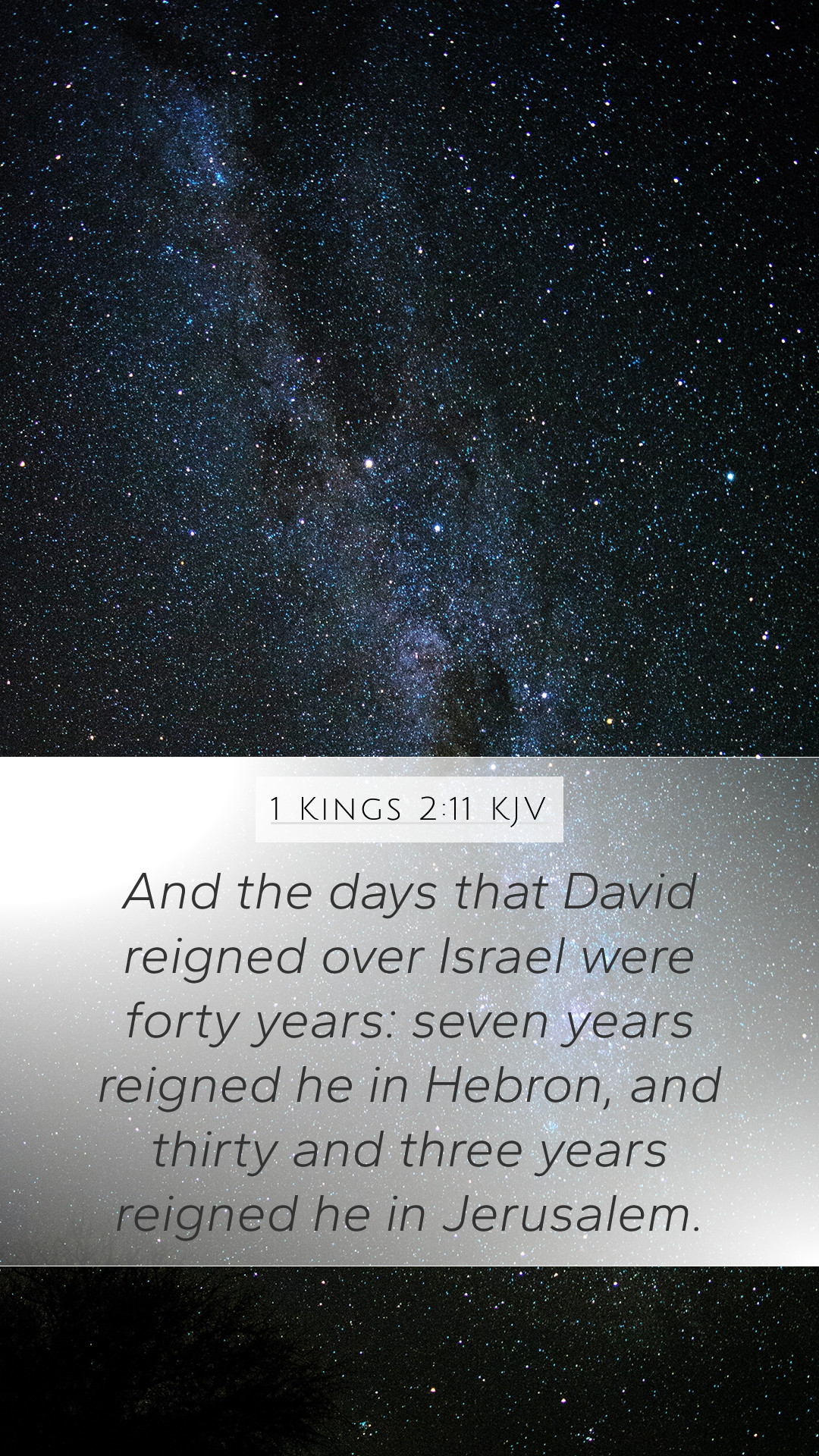Understanding 1 Kings 2:11
1 Kings 2:11: "And the days that David reigned over Israel were forty years: seven years reigned he in Hebron, and thirty and three years reigned he in Jerusalem."
Overview and Context
This verse marks a significant transitional moment in Israel's history as it concludes the reign of David, a pivotal figure in the Old Testament. Understanding the context behind this scripture offers insights into not only David's rule but also the implications for the future of Israel under Solomon's kingship.
Commentary Insights
-
Matthew Henry's Commentary:
Henry emphasizes the importance of David's reign and how his legacy would influence Solomon's leadership. He notes David's longevity as a king and the distinction between his rule in Hebron and Jerusalem, highlighting the unification of the tribes under one kingdom.
-
Albert Barnes' Notes:
Barnes discusses the duration of David's reign in detail, explaining the historical context of his two-phase rule - first in Hebron and then in Jerusalem. He analyzes the significance of these locations and their impact on the nation’s unity and morale. His commentary stresses how this period set the stage for the establishment of Jerusalem as a central religious and political hub.
-
Adam Clarke's Commentary:
Clarke explores the implications of David's rule, noting that the forty years symbolize stability and a significant period of governance. He reflects on David's successes and challenges, hinting at the struggles that the next generation, particularly Solomon, might face. Clarke also highlights the theological understanding of God’s covenant with David, illustrating the divine purpose in this long reign.
Key Themes and Interpretations
The Legacy of Leadership: David's reign is viewed as a period of foundational importance for Israel, reflecting God's promises and the fulfillment of prophetic expectations. This verse serves as a reminder of the weight that leadership carries, both in biblical times and today.
-
The Unification of Israel:
The division of David's reign between Hebron and Jerusalem reflects on the historical struggles of unifying the tribes of Israel, shedding light on the challenges faced by leaders in achieving national cohesion.
-
The Transition of Power:
The verse sets the scene for the transition to Solomon, prompting considerations on succession, the importance of wise leadership, and how past leadership impacts future governance.
Application and Relevance
In applying this scripture to modern life, one might reflect on the importance of legacy and how our actions today can influence future generations. David's story offers lessons in the importance of faithfulness, resilience, and the challenges inherent in leadership roles.
-
Lessons in Governance:
David’s reign encourages leaders to consider their impact on their communities and the importance of pursuing justice and righteousness over personal gain.
-
Personal Legacy:
Each individual can learn to strive for a meaningful legacy, considering how their life choices may influence those who come after them.
Cross References
- 2 Samuel 5:4-5 - The establishment of David's reign.
- 1 Chronicles 29:26-30 - A summary of David's achievements and legacy.
- Psalm 78:70-72 - A reflection on David as a shepherd and leader.
Further Study Resources
For those interested in delving deeper into the Bible verse meanings, interpretations, and explanations, consider utilizing various Bible study tools and resources that focus on:
- Bible study guides
- Bible study lessons
- Online Bible study groups
Conclusion
Understanding 1 Kings 2:11 requires an appreciation for the historical context, theological significance, and the lessons it imparts about leadership and legacy. This scripture serves as a profound reminder of the lasting impact leaders have and encourages each of us to reflect on our own life’s contributions. Through thorough Biblical exegesis and careful scripture analysis, we can glean insights that are applicable to our daily lives.


